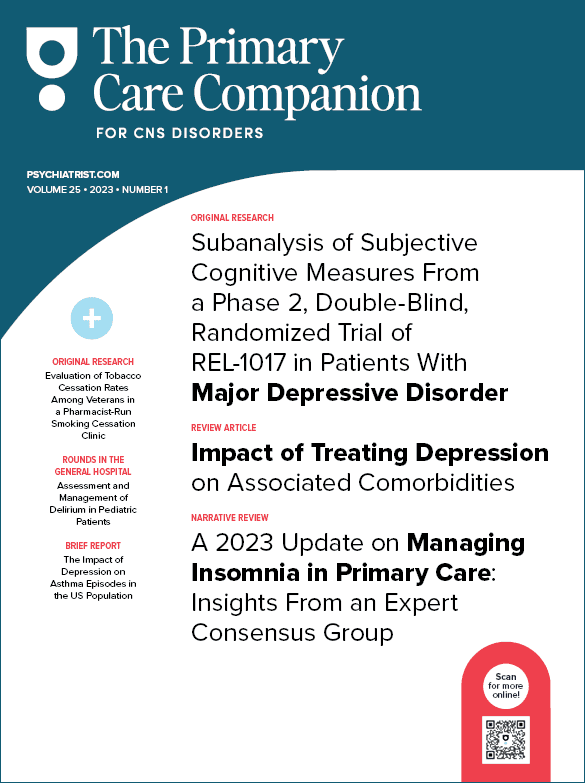
Prim Care Companion CNS Disord 2021;23(4):20l02832
To cite: Cameron-Carter HA, Hopp C, Wells K, et al. Misuse of corticosteroids in a patient with bipolar disorder and secondary adrenal insufficiency. Prim Care Companion CNS Disord. 2021;23(4):20l02832.
To share: https://doi.org/10.4088/PCC.20l02832
© Copyright 2021 Physicians Postgraduate Press, Inc.
aKansas City University of Medicine and Biosciences, Joplin, Missouri
bCommunity Health Network, Indianapolis, Indiana
*Corresponding author: Hadley A. Cameron-Carter, BSc, 32109 Concord Dr, Apt B, Madison Heights, MI 48071 ([email protected]).
It is well known that corticosteroids can cause mania or psychosis in individuals without a psychiatric history,1 and the risk of precipitating mania in those with a history of mental illness is likely higher.2,3 We describe a unique case of a patient with bipolar I disorder and comorbid secondary adrenal insufficiency (SAI) whose long-term corticosteroid use and misuse presented major challenges in psychiatric management. The prevalence of bipolar I disorder and SAI are both low (<2%4 and < 1%,5 respectively). To our knowledge, there are no case reports describing the management of a patient with bipolar disorder with comorbid SAI in the literature.
Case Report
The patient is a 41-year-old Black woman with a past medical history of bipolar I disorder and SAI who presented to a community hospital for psychosis with paranoid and grandiose delusions. She had been brought in by police after she jumped out of a moving vehicle due to severe persecutory paranoia. The patient was taking corticosteroids at the time for treatment of SAI. She was transferred to an inpatient psychiatric unit wherein her psychosis and mania were stabilized over a period of 15 days. A day after discharge, she was arrested for fleeing from police after a routine traffic stop and was readmitted to the hospital.
The patient had a history of manic episodes beginning in her 20s, with a formal diagnosis secondary to the described hospitalization. Also in her 20s, she was treated with prolonged corticosteroids for an unclear rheumatologic condition and developed SAI. She had been on replacement corticosteroids since her mid-30s.
Per medical record review, it was documented that she would frequently overuse her steroids, including self-injecting excessive amounts. She had at least 1 episode of psychosis secondary to overuse of steroids in the past and reported symptoms of mania with higher doses.
The patient was readmitted to a psychiatric unit for an additional 17 days. Psychiatry and endocrinology teams worked together to evaluate and stabilize the patient. During this time, she was stabilized on an antipsychotic, and her corticosteroids were tapered from 20 to 30 mg/day to 12.5 mg/day. The patient had improvement of her psychiatric symptoms, while remaining medically stable. She was ultimately discharged and followed up as an outpatient with psychiatry and endocrinology.
At an outpatient follow-up appointment 6 months following discharge, the patient was compliant with her antipsychotic medication and stable from a psychiatric standpoint. However, her corticosteroid taper had been modified due to hypotension.
Discussion
There are several case reports in which bipolar patients developed symptoms of mania while taking steroids appropriately.6–10 Having a psychiatric history2 or, specifically, a history of bipolar disorder3 may increase the risk of developing psychiatric side effects with high-dose steroid use. Furthermore, it has been shown that higher and chronic dosing of corticosteroids increases the risk of precipitating psychiatric symptoms.11 This patient was likely at a high risk for developing psychiatric side effects due to having a personal history of bipolar disorder, being prescribed chronic corticosteroids, and taking corticosteroids in excess.
Treatment of steroid-induced psychosis traditionally involves discontinuing or tapering the steroid dosage.1,12 However, treatment of SAI may involve steroid replacement therapy.5 If left untreated, SAI can cause hypoglycemia, weight loss, weakness, fatigue, nausea, vomiting, diarrhea,5 and even an adrenal crisis.13
We would like to advocate for a closely integrated care approach between psychiatry and endocrinology specialists in caring for patients with the rare comorbid occurrence of both bipolar disorder and adrenal insufficiency. As described in this case, a careful balance between improving psychiatric symptoms while ensuring that the patient remains medically stable is necessary.
Published online: July 22, 2021.
Potential conflicts of interest: None.
Finding/support: None.
Additional information: Information was de-identified to protect patient anonymity.
References (13)

- Warrington TP, Bostwick JM. Psychiatric adverse effects of corticosteroids. Mayo Clin Proc. 2006;81(10):1361–1367. PubMed CrossRef
- Morrow SA, Barr J, Rosehart H, et al. Depression and hypomania symptoms are associated with high dose corticosteroids treatment for MS relapses. J Affect Disord. 2015;187:142–146. PubMed CrossRef
- Lorefice L, Fenu G, Fois M, et al. Pulse steroid therapy in multiple sclerosis and mood changes: an exploratory prospective study. Mult Scler Relat Disord. 2018;20:104–108. PubMed CrossRef
- Clemente AS, Diniz BS, Nicolato R, et al. Bipolar disorder prevalence: a systematic review and meta-analysis of the literature. Br J Psychiatry. 2015;37(2):155–161. PubMed CrossRef
- Nicolaides NC, Chrousos GP, Charmandari E. Adrenal insufficiency. In: Feingold KR, Anawalt B, Boyce A, et al, eds. Endotext [Internet]. South Dartmouth (MA): MDText.com, Inc; 2000. Accessed June 15, 2021. https://www.ncbi.nlm.nih.gov/books/NBK279083/
- Goldstein ET, Preskorn SH. Mania triggered by a steroid nasal spray in a patient with stable bipolar disorder. Am J Psychiatry. 1989;146(8):1076–1077. PubMed CrossRef
- Panwar V, Lassi K. Stable bipolar patient switched to mania following clinical doses of prednisone. Case Rep Psychiatry. 2011;2011:797658. PubMed
- Sinha A, Dholakia M, Kothari G. Manic episode following epidural steroid injection: a case report. PM R. 2013;5(9):S310–S311. CrossRef
- Saraga M. A manic episode in a patient with stable bipolar disorder triggered by intranasal mometasone furoate. Ther Adv Psychopharmacol. 2014;4(1):48–49. PubMed CrossRef
- Vilela BFC, Hara C, Rocha FL. Ciclesonide as a manic trigger in a patient with long-term stable bipolar disorder: a case report. Braz J Psychiatry. 2020;42(5):568–569.
- The Boston Collaborative Drug Surveillance Program. Acute adverse reactions to prednisone in relation to dosage. Clin Pharmacol Ther. 1972;13(5):694–698. PubMed
- Sirois F. Steroid psychosis: a review. Gen Hosp Psychiatry. 2003;25(1):27–33. PubMed CrossRef
- Rathbun KM, Nguyen M, Singhal M. Addisonian Crisis. In: StatPearls. Treasure Island, FL: StatPearls Publishing; 2020.
Enjoy free PDF downloads as part of your membership!
Save
Cite
Advertisement
GAM ID: sidebar-top




